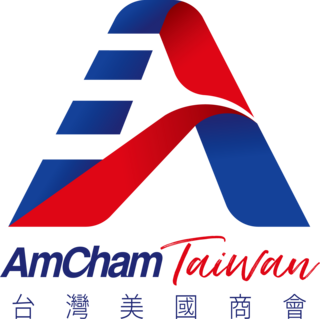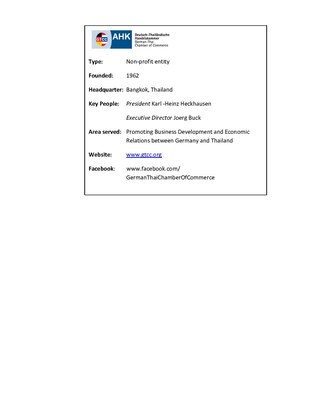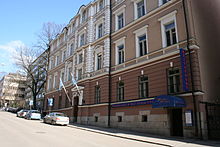
The International Chamber of Commerce is the largest, most representative business organization in the world. Its over 45 million members in over 100 countries have interests spanning every sector of private enterprise.

The United States Chamber of Commerce (USCC) is a business association advocacy group. It is the largest lobbying group in the United States. The group was founded in April 1912 out of local chambers of commerce at the urging of President William Howard Taft and his Secretary of Commerce and Labor Charles Nagel. It was Taft's belief that the "government needed to deal with a group that could speak with authority for the interests of business".

The American Chamber of Commerce in Taiwan is an international business association based in Taipei City, Taiwan, with about 1,100 members representing over 580 companies across various sectors.

The National LGBT Chamber of Commerce (NGLCC) is a U.S. not-for-profit advocacy group that aims to expand the economic opportunities and advancement of the LGBT business community. Its headquarters are in NW in Washington, D.C. NGLCC is the exclusive certifying body for LGBT-owned businesses known as LGBT Business Enterprises (LGBTBEs), and advocates for LGBT business inclusion in corporate and government supplier diversity programs. In October 2017, the organization changed its name from the National Gay & Lesbian Chamber of Commerce to National LGBT Chamber of Commerce to better reflect the entire LGBT business community it serves.

The Australian Chamber of Commerce and Industry (ACCI) is Australia's largest and most representative business association, comprising state and territory chambers of commerce and national industry associations. ACCI represents Australian businesses of all shapes and sizes, across all sectors of the economy, and from every corner of the country.

The Austrian Federal Economic Chamber functions as the federal parent organization for the nine State Chambers and 110 trade associations for different industries within Austria's system of economy. Most State Chambers and associations have local offices to provide services in close proximity to members.

Under the Basic Law, Macau's diplomatic relations and defence are the responsibility of the central government of China. Except diplomatic relations and defence, nonetheless, Macau has retained considerable autonomy in all aspects, including economic and commercial relations, customs control.
The Tanzania Chamber (TCCIA) is a Tanzanian government institution with a mandate to promote industry and business, and to facilitate an interface between the private sector and public sector in the country. TCCIA was founded in 1988 and its head offices are in Dar es Salaam. It has played in important role in the privatization and liberalization of Tanzania's economy.

The ATA Carnet, often referred to as the "Passport for goods", is an international customs document that permits the tax-free and duty-free temporary export and import of nonperishable goods for up to one year. It consists of unified customs declaration forms which are prepared ready to use at every border crossing point. It is a globally accepted guarantee for customs duties and taxes which can replace the security deposit required by each customs authority. It can be used in multiple countries in multiple trips up to its one-year validity. The acronym ATA is a combination of French and English terms "Admission Temporaire/Temporary Admission". The ATA carnet is now the document most widely used by the business community for international operations involving temporary admission of goods.

Eurochambres is the Association of European Chambers of Commerce and Industry. The association is a representative organisation in Brussels for businesses in Europe through 42 members and a European network of regional and local chambers. It was established in 1958 as a direct response to the creation of the European Economic Community.

The American Chamber of Commerce (AmCham) is the leading foreign business organization operating in Russia. Founded in 1994, AmCham advocates the trade and investment interests of its member companies, which include major U.S. Corporations, as well as large European and Russian companies. The Chamber advances commercial relations between the Russian Federation and the international community by promoting an investment-friendly environment. In so doing, the Chamber maintains a constant dialogue with the Russian government to protect and promote the economic interests of member companies.
Association of German Chambers of Industry and Commerce is a German 'chamber,' similar to an English guild but is required under German law and provides political influence of a trade union. This organization was formerly known as the Deutscher Industrie- und Handelstag or DIHT.

André-Pierre Nouvion is a French lawyer and historian of French law.
Federation of Telangana Chambers of Commerce and Industry (FTCCI) is an industry body in Telangana.
A Fachwirt is a professional certification in Germany allocated to level 6 of the European Qualifications Framework
The Indo-German Chamber of Commerce (IGCC) is the largest German bi-national Chamber abroad and the largest Chamber of Commerce in India. It acts as primary contact for Indian and German companies who are willing to establish a business in the other country. It works in close cooperation with the Chambers of Industry and Commerce in Germany (IHKs) and the Association of German Chambers of Industry and Commerce (DIHK).

The Chamber of Commerce and Industry of Serbia is independent, modern and responsible non-budget institution, the national association of all Serbian businesses which its tradition, experience, and knowledge put in the best interest of its members and the economy of Serbia. To establish Serbia as a country with great investment potential, free market economy and open borders, a country prepared to be competitively integrated into the European mainstream. A century and a half long tradition of the chamber system of Serbia and widely spread chamber network encompassing sixteen Regional Chamber of Commerce, two Provincial Chambers, Belgrade Chamber of Commerce and Industry and nine representative offices abroad are supporting economy and the business community.

AHK Thailand or the German-Thai Chamber of Commerce (GTCC) is a non-profit entity which promotes bilateral economic relations between Germany and Thailand. It is a member of the German Chambers of Commerce Worldwide Network (AHKs), with 150 locations in 93 countries around the world.
The American Chamber of Commerce in Shanghai is an organization that promotes American businesses in China through its main offices in Shanghai. AmCham Shanghai was founded in 1915 as the third American Chamber of Commerce established outside the United States, and now has 3,000 members from 1,500 companies. Its membership ranges from large corporations to small startups and includes companies from diverse industries. As a non-profit, non-partisan business organization, AmCham Shanghai promotes free trade, open markets, private enterprise and the unrestricted flow of information.
The Islamic Chamber of Commerce, Industry, and Agriculture (ICCIA) is an international organization that represents the private sector of 57 Islamic countries. It was established in 1977 in Karachi, Pakistan, and has regional offices in several countries. The ICCIA aims to promote trade, investment, and cooperation among Islamic countries. It also provides services to its members, such as market research, legal advice, and trade promotion.
















